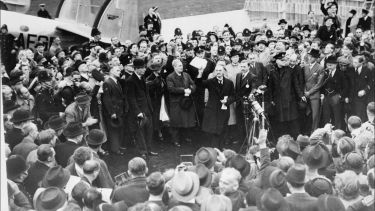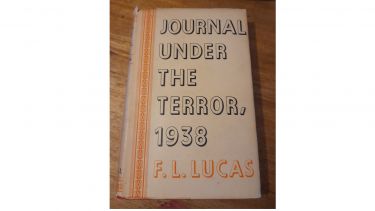- University of Sheffield historian has revealed how the Munich Crisis affected ordinary people across the UK
- Research is the first to show how the UK’s role in appeasing Hitler affected the hearts and minds of the British public
- Munich Crisis of September 1938 - 85 years ago this week - saw British Prime Minister Neville Chamberlain negotiate the Four Powers Pact with Hitler, allowing Nazi Germany to annex parts of Czechoslovakia in attempt to avoid a Second World War
- Historian’s research reveals how the policy of appeasement and the anxious suspence of the Munich Crisis triggered mental health problems for ordinary people throughout Britain, including a spate of suicides, as people feared they were living on the edge of war
Britain’s appeasement of Hitler caused mental health problems for people throughout the country, including a spate of suicides, according to research from a historian at the University of Sheffield.
The research by Professor Julie Gottlieb, Professor of Modern History, is the first to be primarily concerned with how ordinary people throughout the UK responded to the Munich Crisis.
For generations when people said “the war” everyone took it for granted it was WWII, for years after the events of September-October 1938 when people talked about where they were and how they experienced “the Crisis”, they were referring to the Munich Crisis.
As an event, its impact was deep, politically and diplomatically but also emotionally and psychologically.
This week is the 85th anniversary of the Munich Agreement when Britain, France, and Italy agreed that Nazi Germany could take over much of Czechoslovakia. It is also the anniversary of Prime Minister Neville Chamberlain’s separate Anglo-German Declaration that Hitler agreed to sign expressing “the desire of our two peoples never to go to war with one another again.” (30 September).
The Four Powers Pact (or Munich Agreement) - signed by the Britain France, Germany and Italy without consulting Czechoslovakia - was intended to prevent the outbreak of a Second World War, after Hitler had threatened to invade the Sudetenland, border regions in Czechoslovakia where three million people of German origin lived.
After granting almost all of Hitler’s demands and leaving Czechoslovakia defenceless, Chamberlain returned to Britain declaring he had secured ‘peace for our time’. This ultimately proved to be untrue when Hitler went on to seize the whole of Czechoslovakia six months later in March 1939. Germany then invaded Poland prompting Britain to declare war less than a year later..
Professor Gottlieb has studied letters and private and published diaries written by ordinary Britons at the time, held in the Mass-Observation Archive and the Neville Chamberlain papers, that offer insight into how the crisis affected the hearts and minds– and mental health– of the British public.
Findings from the research show that the crisis had a significant psychological impact on people across the UK. The Crisis and fear of war also triggered an apparent epidemic of suicides, as people responded to the Crisis and feared the outbreak of war. This was expected to be a war that would take the heaviest toll on civilians, and a war from the air.
Professor Gottlieb said: “It has been traditional to study the history of appeasement from above, as high politics, with little regard for the deep and almost universal emotional toll it took on people across the country and from all walks of life. This was the preamble to the ‘People’s War’ (the myth of British war-time resilience). Indeed, we should see the Munich Crisis as the ‘People’s Crisis’. The political and emotional resonances with crises in our own time and place are powerful.”
As part of her research, Professor Gottlieb has highlighted how one couple’s marriage dramatically and tragically broke down under the psychological stress of the Munich Crisis and fear of war in Europe.
Journal Under the Terror, 1938 (1939) was written by F. L. Lucas, a Yorkshire-born writer, political commentator and voice against appeasement. The Journal documents how the political crisis was mirrored in his private life with the mental breakdown of his wife Prudence, and the breakdown of their marriage.
Professor Gottlieb has since worked with the award-winning playwright Nicola Baldwin to produce a new play - The Nervous State - based on F. L. Lucas’ journal, and to help raise awareness of the pressures that a political crisis can put on people’s relationships and the impact that major world events can have on people’s mental health.
The correspondence written by ordinary Britons at the time, uncovered by the Sheffield historian’s research, along with the dramatic adaptation of F. L. Lucas’ Journal, are also being used in a project led by Professor Gottlieb to help schools throughout the UK teach the Munich Crisis as part of their history lessons.
Professor Gottlieb added: “The topic of appeasement and the Munich Crisis is frequently covered in the history curriculum in schools, but mainly from a pretty traditional point of view, about great men and so-called ‘guilty men’. It is an important topic to cover, and it remains so salient, and a repeated touchstone in political discussion and debate. But the topic resonates in other ways too, especially in our own moment in time, in our period of ‘permacrisis’. Working with teachers and high school students, my team of collaborators have been really encouraged by how well they have responded to thinking about the Munich Crisis from the perspectives of history from below and history from within, and it provides a great opportunity for historical empathy.”
Following the success of The Nervous State, playwright Nicola Baldwin is further collaborating with the Sheffield historian to produce a full film based on the journal of F. L. Lucas, which is set to announce casting next month (October 2023).
Contact
For further information please contact:






